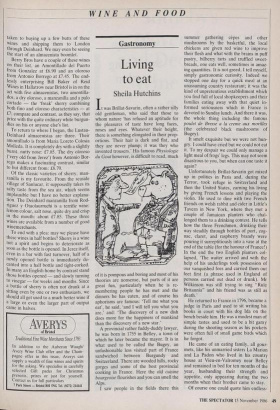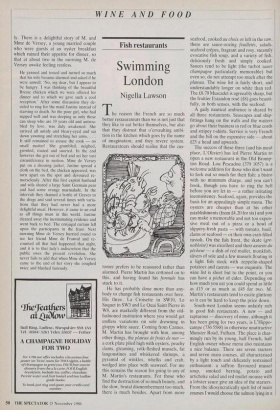Gastronomy
Living to eat
Sheila Hutchins
It was Brillat-Savarin, often a rather silly old gentleman, who said that those to whom nature 'has refused an aptitude for the pleasures of taste have long faces, noses and eyes. Whatever their height, there is something elongated in their prop- ortions. Their hair is dark and flat, and they are never plump; it was they who invented trousers.' His famous Physiologie du Gout however, is difficult to read, much
of it is pompous and boring and most of his theories are nonsense, but parts of it are great fun, particularly when he is re- membering people he has met and the dinners he has eaten, and of course his aphorisms are famous: 'Tell me what you eat', he said, 'and I will tell you what you are,' and: 'The discovery of a new dish does more for the happiness of mankind than the discovery of a new star.'
A provincial rather fuddy-duddy lawyer, he was born in 1755 in Belley, a town of which he later became the mayor. It is in what used to be called the Bugey, an unfashionable less visited part of France sandwiched between Burgundy and Switzerland. There are wooded hills, rocky gorges and some of the best provincial cooking in France. Here the old cuisine bourgeoise flourishes and you can smell the Alps.
I saw people in the fields there this summer gathering cepes and other mushrooms by the basketful, the local chickens are given red wine to improve their flesh and what with the brains in puff pastry, bilberry tarts and truffled sweet- breads, one eats well, sometimes in amaz- ing quantities. It is not greed, I tell myself, simply gastronomic curiosity. Indeed we stopped one day for a quick meal at an unassuming country restaurant; it was the kind of unpretentious establishment which you find full of local shopkeepers and their families eating away with that quiet in- formed seriousness which in France is devoted to Sunday lunch. And there it was, the whole thing including the famous poulet de Bresse a la creme aux morilles (the celebrated black mushrooms of Bugey).
It smelt exquisite but we were not hun- gry. I could have cried but we could not eat it. To my despair we could only manage a light meal of frogs' legs. This may not seem disastrous to you, but when can one taste it again?
Unfortunately Brillat-Savarin got mixed up in politics in Paris and, during the Terror, took refuge in Switzerland and then the United States, earning his living by giving French lessons and playing the violin. He used to dine with two French friends on welsh rabbit and cider in Little's Tavern in New York, where they met a couple of Jamaican planters who chal- lenged them to a drinking contest. He tells how the three Frenchmen, drinking their way steadily through bottles of port, cog- nac, claret, and raspberry brandy were pouring it surreptitiously into a vase at the end of the table (for the honour of France!) In the end the two English planters col- lapsed, 'The waiter arrived and with the help of his underlings took possession of our vanquished foes and carried them out feet first (a phrase used in England of persons carried out dead or drunk). Mr Wilkinson was still trying to sing "Rule Britannia" and his friend was as still as death.'
He'returned to France in 1796, became a judge in Paris and used to sit writing his books in court with his dog Ida on the bench beside him. He was a modest man of simple tastes and used to be a bit gamy during the shooting season as his pockets were often full of small game birds which he forgot.
He came of an eating family, all gour- mets, like his unmarried sisters La Marion and La Padon who lived in his country house at Vieu-en-Valromey near Belley and remained in bed for ten months of the year, husbanding their strength and appetite, only appearing during the two months when their brother came to stay.
Of course one could quote him endless-
WINE AND FOOD
ly. There is a delightful story of M. and Mme de Versey, a young married couple who were guests at an oyster breakfast which ruined their appetite for dinner, so that at about two in the morning M. de Versey awoke feeling restless.
He yawned and tossed and turned so much that his wife became alarmed and asked if he were unwell. 'No, my dear, but I appear to be hungry. I was thinking of the beautiful Bresse chicken which we were offered for dinner and to which we gave such a cool reception.' After some discussion they de- cided to ring for the maid Justine instead of starving to death. So the poor girl, who had supped well and was sleeping as only those can sleep who are 19 years old and untrou- bled by love, was duly awakened. She arrived all untidy and bleary-eyed and sat down yawning and stretching her arms. . . . It still remained to arouse the cook — no small matter! She grumbled, neighed, growled, roared and snorted. In the end however she got out of bed and set her vast circumference in motion. Mme de Versey put on a dressing jacket, Justine spread a cloth on the bed, the chicken appeared, was torn apart on the spot and devoured re- morselessly. After this first exploit husband and wife shared a large Saint Germain pear and had some orange marmalade. In the intervals they drained a bottle of Graves to the dregs and said several times with varia- tions that they had never had a more delightful meal. However, it came to an end as alt things must in this world. Justine cleared away the incriminating evidence and went back to bed. The conjugal curtain fell upon the participants in the feast. Next morning Mme de Versey hurried round to see her friend Mme de Franval and re- counted all that had happened that night, and it is to that lady's indiscretion that the public owes the present revelation. She never fails to add that when Mme de Versey came to the end of her story she coughed twice and blushed furiously.



































































 Previous page
Previous page